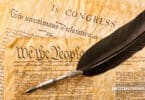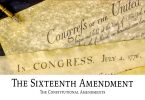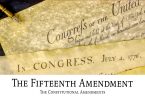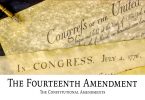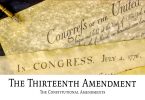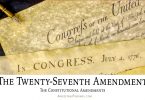The Twenty-Third Amendment to the US Constitution gives people living in Washington, D.C. the right to vote in presidential elections. It also grants Washington, D.C. a slate of presidential electors, as if it were a state—with the caveat that it can never have more electors than the least populated US state. This amendment was proposed by Congress in June of 1960 and was adopted to the constitution on March 29, 1961.
What Does it Say?
“Section 1. The District constituting the seat of Government of the United States shall appoint in such manner as the Congress may direct:
A number of electors of President and Vice President equal to the whole number of Senators and Representatives in Congress to which the District would be entitled if it were a State, but in no event more than the least populous State; they shall be in addition to those appointed by the States, but they shall be considered, for the purposes of the election of President and Vice President, to be electors appointed by a State; and they shall meet in the District and perform such duties as provided by the twelfth article of amendment.
Section 2. The Congress shall have power to enforce this article by appropriate legislation.”
What Does it Mean?
The Constitution gives each state a number of presidential electors for presidential elections. That number is proportional to each state’s population. Because Washington, D.C. is not a state, it was not granted any electors in the original version of the US Constitution. Because of this, the city did not have any say in who was elected US President, which was unfair to the people who lived there, as they were US citizens.
People were aware of this disparity, and an amendment to correct it was proposed as early as 1888, but these earlier versions of what would become the Twenty-Third Amendment did not have a lot of support in those days.
The Civil Rights movement of the 1950s renewed interest in giving Washington D.C. its own electors, and its citizens the right to vote in US presidential elections. When it came up again as a suggestion in Congress, it had strong bipartisan support, and President Dwight D. Eisenhower endorsed it. When the amendment was ratified the next year by being approved by the requisite ¾ of US state legislatures, its adoption made Washington, D.C. the only entity besides the US states to have representation in the Electoral College.
After the amendment’s adoption, the first presidential election in which the citizens of Washington, D.C. were eligible to participate was the 1964 election. Since that time, Washington, D.C. has always had three presidential electors to represent it in the Electoral College, as that is the number of electors allotted to the least populated US states. The city’s population has never reached the number where it would otherwise be granted more electors if the rules of the amendment were different.
The amendment only gives Washington, D.C. its own electors, and its citizens the right to vote in presidential elections. It does not grant the citizens of Washington, D.C. any voting rights in Congress, the right to participate in amending the US Constitution, or home rule.

